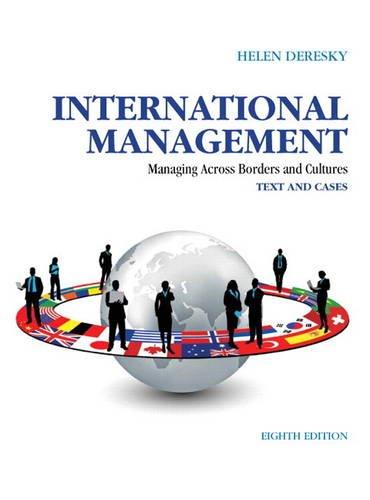There are thousands of Australians, both individually and as members of organizations, who share trade and education
Question:
There are thousands of Australians, both individually and as members of organizations, who share trade and education with Indonesia as do New Zealanders. Yet, though geographically part of Asia, citizens of Australia and New Zealand are members of cultures very different from any other in Asia.
As increasingly they seek to trade in Asia, so also do they need to learn to manage such differences; and doing business in Indonesia is a good example. Travelling time by air from Perth, Western Australia, to Indonesia is slightly less than four hours, yet the cultural distance is immeasurable.
In January 2007, the Jakarta Post reported GDP growth had risen to over 5%. Consumer consumption drives the economy but exports are thriving, and therein lay opportunities for Australia and New Zealand.
Indonesia is a country of more than 17,000 islands and the world’s largest Muslim nation. In her lecture, Dr. Joan Hardjonoof Monash University discussed the historical and geographic contexts of modern Indonesia. She spoke of the many clusters of islands worldwide that have come together as nation states—for example, the Philippines and some island groups in the Pacific— but described the Indonesian archipelago as in a class of its own.
It is unique in terms of extent and diversity. For example, Java and Bali have fertile volcanic soils, while elsewhere the land is rich in mineral resources such as oil, natural gas, and coal. Climatic conditions vary from island to island. Some regions experience annual heavy rains and floods, while others suffer regularly from droughts that often lead to famines.
With a population of more than 230 million people, Indonesia is the fourth most populous country in the world, but there is a great imbalance in population distribution within the archipelago. Settlement has always been greatest on the island of Java, and today about 60% of the Indonesian population lives there.
National ties are strong, as revealed by the great response from within Indonesia to the recent natural disasters in Aceh and Nias. Unfortunately, there are still very obvious socio-economic disparities in all regions of the country. At the top of the social structure are wealthy elites, below them an increasingly demanding middle class, and at the bottom an impoverished majority.
As Indonesia has become more integrated with ASEAN, North Asian trading partners have become more important: but well-to-do Indonesians now travel the world. Globalization has been the buzzword of international business for many years. International markets have split up into unified trade zones; individual marketplaces, particularly in the developing countries, are exposed to transnational pressures.
Some Asian countries are pulling back from perceived threats of international contagion, but Indonesia continues to open up its markets to world enterprise. However, Australians and New Zealanders cannot expect to do business with Indonesians just because they are neighbors. They have to learn the moves.
Business opportunities in Indonesia include agribusiness; the automotive industry; business and financial services; construction and infrastructure; information and communication technology; e-commerce; education and training; environmental products and services; food and beverages; fresh produce; health and medical provisions; mining and mineral services; oil and petroleum drilling, transport and storage; and science and technology.
Questions
1. Using this case and the cultural dimensions explored in this chapter, discuss some of the ways in which citizens of Australia and New Zealand are members of cultures very different from any other in Asia.
2. In what respects is the Indonesian archipelago unique in Asia?
3. What characteristics of Indonesian workplaces are referred to in this profile?
4. How does the population appear to be socially stratified?
5. What are some business opportunities in Indonesia for foreign direct investment?
Step by Step Answer:

International Management Managing Across Borders And Cultures Text And Cases
ISBN: 9780133062120
8th Edition
Authors: Helen Deresky





